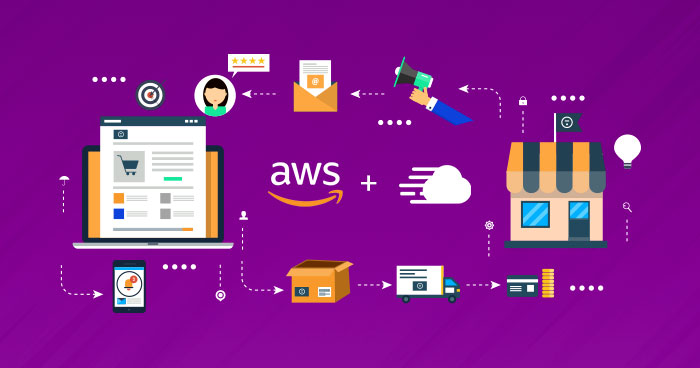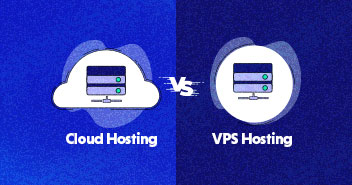
Cloud hosting has become the gold standard of hosting solutions these days. All popular ecommerce stores, such as Snapdeal, Alibaba, and Amazon, runs on cloud hosting solutions.
In this article, I will demonstrate why AWS ecommerce solutions are leading the market and why AWS is the best for mid-level and high-traffic stores
Download The List of Tools for Developers
We’ll email you the complete list shortly.
Thank You
Your list is on it’s way to your inbox.
-
- The Impact of Hosting on Ecommerce Success
- How AWS Ecommerce Solutions Are Taking over the World
- Why Cloud Hosting Is Best for Ecommerce in Contrast to Traditional Hosting
- Why Ecommerce Stores Migrate to AWS?
- What Architecture Does AWS Provide for Ecommerce Applications?
- Migrating to Managed AWS Hosting Simplifies Your Ecommerce Projects
- Managed Hosting Simplifies Your Ecommerce Projects
- Conclusion
1. The Impact of Hosting on Ecommerce Success
Just 10 years ago, when ecommerce store owners went shopping for a hosting solution, their prime considerations were traffic load management and affordability. This was one of the reasons why ecommerce stores started with shared hosting solutions (the price factor) and then upgraded to Virtual Private Servers (VPS) to deal with growing traffic load. This used to be the typical journey of ecommerce stores.
Time has evolved, and now the competition in the ecommerce industry has heated up. Hosting solution that powers the store has become a decisive edge. To deal with the competition, the selection criteria for hosting solution has changed to reflect the current situation. In particular, the factors that affect the selection of a particular hosting solution include the following pointers.
i. Server Uptime
In the ecommerce industry, downtime directly translates into a loss in revenue and customers. This is why uptime is often the first factor when selecting the hosting provider for an ecommerce store.
ii. Scalable Resources
During the Holiday Season, all ecommerce stores experience a significant increase in traffic and user requests. This significantly increases the demands for server resources (RAM, Bandwidth, and Storage). As such, a hosting solution that offers scalable server resources is ideal for ecommerce stores.
iii. Simple Backup Processes
Ecommerce store owners know that the most important asset on their store is the product and customer data. Thus, server backup processes that provide both automated and on-demand backups with onsite and off-site storage are an essential component of store management and disaster response strategies.
iv. Extendible Platform
Digital marketing for ecommerce stores now requires the use of a host of native and third-party tools. Several tool categories such as performance measurement tools, email marketing, and social media management tools and CRM (Customer Relationship Management) have become integral to store operations. A hosting solution that supports problem-free integration of these tools is always preferred over the competitors.
v. Pay for Consumption Billing
Running an ecommerce store can get costly. The popular payment model for ecommerce hosting used to be fixed monthly installments, regardless of the level of consumption of server resources. However, many store owners now prefer the pay to consume model in which they only have to pay for the resources they consume. This simplifies the billing cycles and allows ecommerce stores to remain viable during the downtime.
2. How AWS Ecommerce Solutions Are Taking over the World
Popular retailers and ecommerce stores such as Nordstorm, Instacart, and Snapdeal host their core applications on AWS ecommerce architecture. Since Amazon Web Service (AWS) is a pioneer in the cloud industry, it hosts a number of popular brands including Unilever and Airbnb.
The most important reason behind this decision is the robust architecture that ensures that the ecommerce stores are able to leverage the AWS platform’s reliability to interact with the visitors and achieve the sales target. Additionally, the ability to scale server resources in minutes and (almost) unbeatable multi-level AWS security offers ecommerce stores a solid and globally-compatible infrastructure that is second to none.
AWS platform has the benefit of improving its ecommerce architecture and services in the light of the experiences of operating Amazon, the world’s largest ecommerce platform. This has led to the development or several industry-leading technologies that have made AWS ecommerce solution the best ecommerce platform out there.
Just to give you a hint of these features that have made AWS ecommerce an awesome solution, let me introduce the Catalog Service that is powered by another innovative technology, NoSQL (a fast and scalable database capable of handling large volumes of traffic by adding in more servers). Every ecommerce store owner understands the importance of a powerful catalog component that is central to store inventory management and related areas.
As you might have guessed, NoSQL is a popular DBMS that is very popular in a range of domains and application scenarios.
3. Why Cloud Hosting Is Best for Ecommerce in Contrast to Traditional Hosting
i. Handling Peak Hour Traffic
Ecommerce stores just can’t afford to crash during peak season. That where scalability comes in. It helps ecommerce stores deal with a lot of traffic and increase customer activity in a dynamic way. As user activity increases, stores on cloud solution scale up the resources simultaneously to cater to the load.
ii. No Fear of Losing Data
When files storage is on a physical hard drive, and it gets corrupted, recovery of data is nearly impossible. Such a risk can’t be afforded when it comes to crucial day to day dealings in business operations data. Therefore, by hosting ecommerce business on the cloud, system failures or physical damages will not have an adverse effect on the daily business operations. Servers will be functional at all times while ensuring smooth customer activity.
iii. Bandwidth Issue
Cloud-based solutions are perfect for ecommerce businesses which have fluctuating bandwidth requirements. When bandwidth requirement increases, it is pretty easy to scale up the resources immediately with no fear of slowing the main website/webpage down.
Start AWS Cloud Hosting today
The most reliable web hosting for all kinds of web-based applications, offering high-speed performance and scalability.
iv. Reliability
The main driving force for any business in achieving its business goals is almost always teamwork. The same sort of relationship can be seen when we talk about cloud hosting services. When the load is distributed evenly among the cloud server, the website functions at an optimal level. So it’s safe to say that your website has a continuous backup system that can always be used to restore to.
v. Full Root Access
Cloud hosting provides its users with complete control over their hosting platform. Having full root access means that the user can easily install updates and latest applications on their server, which ensures smooth operations of their website.

4. Why Ecommerce Stores Migrate to AWS Ecommerce Platform?
Retailers and Ecommerce stores such as Nordstorm, Instacart, and Snapdeal have migrated to AWS architecture and now have their core applications on Amazon Web Services (AWS) Cloud. There are two reasons for this. The first pertains to staying ahead of the technological curve where in this interconnectivity requires technology to interact, engage, and achieve sales. The second reason is for these brands to opt for more secure, reliable, flexible, and globally compatible infrastructures which let them scale after they migrate to AWS architecture.
Being the pioneer in the cloud computing industry, it now hosts the application of major brands such as Unilever and Airbnb since AWS is the market leader when it comes to the cloud industry although Google’s GCE hosting and Microsoft Azure have joined the fray to succeed in the race.
Read how to host WooCommerce on Amazon (AWS)
Most service providers by AWS platform are from the learnings of their Amazon technology team who have been managing some of the world’s largest ecommerce stores. To give you an example of one of their best work, they designed a NoSQL database technology to develop a very efficient product known as a ‘Catalog Service.’ This Catalog service is the fundamental technology component to power an ecommerce store. If you are wondering what a NoSQL database is, and why is it considered an achievement, its basically a fast database which is scalable and can handle large amounts of traffic by adding in more servers.
Just like the way NoSQL technology is embraced by many developers across a wide variety of application domains and uses cases, Similarly AWS ecommerce solution for ecommerce stores and online retail shop is an ideal cloud solution which is embraced by the entire business community because of strong AWS monitoring and security processes.
Load Your Ecommerce Store Under 1 Second
Google loves websites that load in a SINGLE second. Our fast ecommerce hosting will allow you to do so without any hassle.
5. What Architecture Does AWS Ecommerce Platform Provide for Ecommerce Applications?
i. Efficient Catalog Service
Effective cataloging is the backbone for any ecommerce store to be successful. Updating the ecommerce regularly with a variety of product catalogs along with the customer base can be a daunting task. On top of all that, the catalog needs to be indexed and searchable. Every individual page should consist of rich information such as customer review, images, and the info of the product which a user desires to seek.
In an increasingly interconnected digital world, online demand of a store can reach a new peak through social media awareness, for example; giveaways, offers, or deals. Customers (visiting users) are impatient, and their demand for easy, swift access to the product catalog is increasing on a daily basis. Any glitch in performance here can seriously impact the reputation of a brand.
The most important consideration when running an ecommerce business store on cloud services is its robust architecture and application engineering which allows the computing resources to simultaneously scale up and scale down as per need of the hour to avoid unnecessary billing cost. With this proper auto-scaling feature management, ecommerce store will be able to handle millions of catalog view along with tons of transaction of orders, seamlessly to meet top-line objectives.

The needs of the ecommerce business is to get necessary configurations and architecture. AWS ecommerce platform provides its users with ready-to-use ecommerce architecture and blueprints in the form of AWS Cloud formation templates. These templates are provisioned to highly scalable and available infrastructure for hosting online stores.
Ecommerce web apps and platform providers such as Magento have noticeably published versions of their software to finetune to AWS architecture and integrate AWS monitoring and security processes.
With AWS architecture, it’s now a piece of cake to build an ecommerce website with an efficient product catalog that scales with your business.
ii. An Innovative Checkout Process
The next critical building block for an ecommerce store is checkout service. Keeping the checkout service in proper order involves many workflows and steps which need to be coordinated. In addition to this, things like purchase history of a user and credit card transactions are subject to specific regulatory requirements. Above all that, customers now expect their private data such as credit card information, personal information, order history to be kept secure on compliant application stack and managed secure infrastructure.
Keeping these views into consideration and to help ecommerce stores accomplish regulatory compliance and security, AWS security provides a secure and certified cloud infrastructure for ecommerce applications. Now, ecommerce store owners get better cloud security of lower layers of the system like storage, compute, and network since AWS allows them to build an application layer over it. It’s, for this reason, AWS security has obtained multiple cloud security certifications relevant to ecommerce business, including the Payment Cards Industry (PCI) and Data Security Standard (DSS), on these lower system layers.

When it comes to application-level security of any system built on AWS, as per its Shared Responsibility Model, AWS is not responsible, but, however, AWS does provide many tools to facilitate the enforcement of AWS security best practices protocols. Some of these are audit tools like web-application-firewalls and compliance ‘checkers.
In addition, AWS ensures to regularly publish security best practice documentation based on its customer experience. One can build a secure checkout service which would manage the purchasing workflow from order to fulfillment from the tools AWS provides.
Though search, catalog, and checkout services are the main building blocks for ecommerce businesses. It is the business logic which differentiates them from one another. To ensure the smooth functioning of the ecommerce store, one has to almost always create a custom software component.
Additionally, developer-oriented tasks such as server management, and culture is very critical for the ecommerce store as new features are on deployment schedule every day to support the user’s demand and needs.
AWS offers an ecosystem that places control in the hands of users. They have introduced a mechanism for AWS monitoring of server which provides important metrics for infrastructure and ecommerce application. They have access to an infrastructure that opens up pathways to applications and websites. AWS for ecommerce stores provides users with the flexibility of accommodating configurations to achieve these business milestones.
6. Migrating to Managed Cloud Hosting for AWS
Though search, catalog, and checkout services are the main building blocks for e-commerce businesses. It is the business logic which differentiates them from one another. To ensure the smooth functioning of the ecommerce store, one has to almost always create a custom software component.
Although AWS offers an ecosystem that places control in the hands of users and they have access to an infrastructure that opens up pathways to applications and websites, but developer-oriented tasks such as server management, and culture is very critical for the ecommerce store as new features are on deployment schedule every day to support the user’s demand and needs.
Store owner hires in-house DevOps team to manage server related issues, with the hope of investing more time on marketing activities. However, gradually, they realize the inhouse team does not justify ROI (Return on investment) as when compared to outsourcing it to an agency. However, there is always a fear of credential leaks and private data sharing. To address these concerns, store owners go for migrating their ecommerce application to managed AWS Cloud hosting.
Managed AWS Cloud hosting makes life easy for many ecommerce store owners who don’t have or can’t afford in-house DevOps teams to manage their servers. By migration to managed AWS cloud, ecommerce store owners outsource the most technical aspect of server management while improving site performance and security.
7. Managed Hosting Simplifies Your Ecommerce Projects
Third-party providers build an infrastructure on top of AWS, making it easier for the user to run operational tasks. Furthermore, this removes complexities of directly dealing with AWS Ecommerce architecture as the outsourced development team handles this.
Services like these assist most of AWS operations such as server creation, server security, and everything in between. In most cases, server providers also specialize in web applications like WordPress, Magento, and Larval for their customers.
Cloudways, a managed AWS Cloud Platform, makes AWS for ecommerce store owners piece of cake. Store owners can easily set up the server and deploy their favorite ecommerce application such as Magento or WooCommerce easily within few minutes. Cloudways makes sure that store owners don’t get their hands dirty with server management. Therefore, they are provided with managed UI Interface to perform a server-level operation such as to install SSL, Varnish, etc.
AWS Managed hosting is a simple process of setting up the server and deploying the suitable web application within a few minutes. However, it’s important to note that the customer using the managed AWS ecommerce solution may not directly deal with the server but instead interacts with a custom browser or software-based interface to perform server-level operations.
The third-party provider continues to put forth feature-rich tools, plugins, caches, syscaches, and database options that continuously improve the website’s experience for the visitor. Apart from that, the third party is also partially responsible for the security of the server. Though this may not be directly their responsibility, however, to ensure that the business keeps running, they continue to offer AWS security features to give their customers a sense of protection from common cyber attacks. These tools include Intruder Detection System (IDS), firewalls, and other related functions.
All in all, these third-party providers aim to give their customers a rich experience of running their business without losing out on much time
8. Conclusion
AWS ecommerce provides security, universal, scalable infrastructure, and core features to online retail companies that they can then work on. As the company sales increase and growth milestones are completed, the AWS infrastructure provides more scalable features.
Similar to AWS ecommerce architecture. Cloudways also provides a clutter-free experience for the server owner. Sometimes, it gets too complicated to run a simple task, so with a premium, Cloudways reduces the clutter and makes it easy to run most operations that AWS’s platform also provides. Furthermore, they have a technical team available round the clock to help in case of any complications.
Salman Saleem
Salman is a software engineering graduate and digital marketer by profession. He works as a Digital Marketer Strategist at Cloudways. He loves to create value for the Startup community & help entrepreneur reach their goal. He is a big fan of cricket and does play AAA games in his free time.


